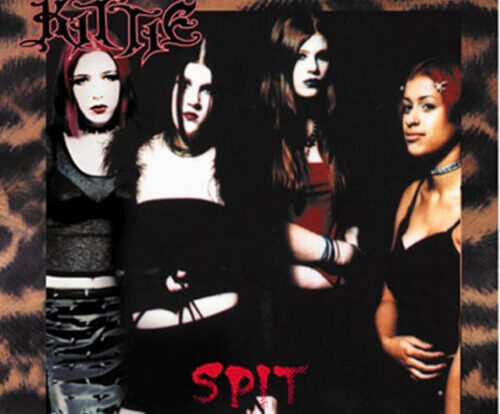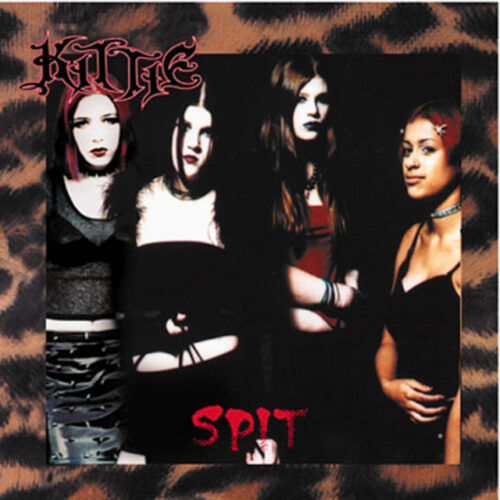
Music is for everyone, that much is true, but it’s fair to say that certain genres seem – on the outside at least – to be tailored towards certain societal groups. For example, metal is generally seen as more male-oriented owing to its aggressive, more masculine style and the fact that an overwhelming majority of bands are made up of men. In 2025, there is little care given to who’s in the band as opposed to how good their output is, but at the turn of the millennium, this was not the case – just ask Canadian metallers KITTIE and the sensation of debut album Spit.
KITTIE was formed in September 1996 by drummer Mercedes Lander and guitarist Fallon Bowman, bringing in Mercedes’ sister Morgan on vocals and second guitar shortly after; Tanya Candler would later join on bass. When local music venue Call the Office started a Battle of the Bands competition, the trio signed up, choosing the name KITTIE because, as Morgan would say, it seemed contradictory. “Usually females are perceived as being cute, fragile and feminine, like the name KITTIE” she told Metal Maidens magazine in 1999, “The contradiction comes in, when the listener hears what our music really is about: women playing metal.”
In March 1999, at the Canadian Music Week festival in Toronto, KITTIE approached Jason Wyner, who was the second-in-command of label Ng Records. Although Wyner had rejected the band’s demos sent to the label – Sexizhell and Kittie respectively – their performance impressed him so much that KITTIE were given a four-album deal and entered the studio two months later with legendary producer Garth Richardson at EMAC Studios.
Recorded in the span of nine days, all four members of KITTIE were still in high school at the time, meaning recording time took place in the evenings at the studio and after the band had eaten dinner and finished their homework, never going beyond 10pm. Morgan would tell Martin Popoff of HardRadio in 2000 that Richardson, impressed by their demos, did it for virtually no financial gain. “He did it for beans” she explained, “He took his time out from doing other projects and basically said ‘Okay, I’m going to do this album’”.
Lyrically, the album explores themes of hate, ignorance and sexism; both the title track and Raven were inspired by the attitude of local bands towards KITTIE, the latter specifically a death threat sent by a male band who were competing against KITTIE in a talent competition. Charlotte discusses a fictional serial killer, while Get Off (You Can Eat A Dick) was inspired by a school teacher who told the band to ‘get off’ the stage after one song of a talent show. Despite the titles, none of the tracks are explicitly about sex, a common misconception at the time.
Spit was initially released on November 13 1999, but its production was short-lived as Ng Records were absorbed into Artemis Records not long after. The new label decided to re-release the album, but there were delays as the band re-recorded Paperdoll after bassist Candler, who had sung lead vocals on the song, had abruptly left in the autumn and was replaced with Talena Atfield. The artwork was also updated, with Atfield in Candler’s place, and Spit received its wider release on January 11 2000. Reviews were mixed to positive, mainly praising its aggressive nature but also criticising the lyrics, song titles and one-dimensionality. In support of the album, KITTIE would open for SLIPKNOT and headline the second stage of 2000’s Ozzfest; they were the youngest, and only female, act on the latter.
A lot of the media focus at the time of Spit’s release was on the members’ ages (supposedly revealed by Artemis Records without their consent) and the fact they were an all-female band, much to the dismay of the four involved. “You don’t call MACHINE HEAD a ‘boy metal band’; why should they make an exception because of our gender?” Mercedes lamented at the time as reported by MTV News. They were also pinned as ‘anti-Britney’ (in reference to pop sensation BRITNEY SPEARS) after a comment made by Morgan on the band’s website that she wasn’t “up there singing Hit Me Baby One More Time!, we’re a lot more mature than that”. In subsequent years, the band would look to distance themselves from Spit due to the ‘strange stigma’ created that they were all about image and not music, even so far as to going for a death metal style on third album Until The End (2004) and abandoning live performances of any of Spit’s material for a while.
Yet, as time went on, those views would soften, not just on the album but the overall nu-metal involvement, especially in light of the influence that Spit would have on those who grew up with it. Serena Cherry of SVALBARD and NOCTULE has cited the record as the reason she became a metal musician, while POPPY covered the title track in 2023 and Rolling Stone placed it at #82 on their list of ‘The 100 Greatest Heavy Metal Songs of All Time’ that same year. The album remains KITTIE’s best selling, certified gold in the US and having sold over 600,000 copies to date. “I have learned over time to be proud of having an album that is part of that seminal nu-metal movement” Morgan would reflect upon release of seventh album Fire (2024) to Revolver, “I’m proud of our contribution.”

Spit was given its wider release on January 11 2000 via Artemis Records.
Like KITTIE on Facebook.
The post HEAVY MUSIC HISTORY: Spit – Kittie appeared first on Distorted Sound Magazine.


